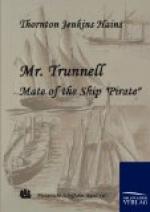The dense vapor rolled in cool masses over the wreck, and the gentle breeze freshened so that the topsail, which still drew fair from the yard, bellied out and strained away taut on a bowline, taking the wind from almost due north, or dead away from the Cape. The Sovereign shoved through it log-wise under the pull, the swell roaring and gurgling along her sunken channels and through her water ports. She was making not more than a mile an hour, or hardly as fast as a man could swim, yet on she went, and as she did so, she was leaving behind our last hope of being picked up.
XII
The first night we spent aboard the hulk was far from convincing us of her seaworthiness. I had been in—a sailor is never “on board”—two ships that had seen fit to leave me above them, but their last throes were no more trying to the nerves than the ugly rooting of the Sovereign into the swell during that night. At each roll she appeared to be on the way to turn her keel toward the sky, and, at a plunge slowly down a sea-slope, she made us hold our breaths. Down, down, and under she would gouge, the water roaring and seething over sunken decks amidships, and even pouring over the topgallant rail until it would seem certain she was making her way to the bottom, and I would instinctively start to rise from the cabin transom to make a break for the deck. Then she would finally stop and take a slow heave to windward, which started a Niagara thundering below the deck, where the cargo was torn loose and sent crashing about in a whirlpool.
I once read a description by an English landsman of a shipwreck, and he told how the water would rest for an instant level with the rail, seeming to pause motionless for a fraction of a second before flowing over and sinking the ship, I lay a long time wondering vaguely at an imagination that could make such a description possible, and as a heaving swell would start along the rail at the waist, and go thundering along in a roaring surf the entire length of the midship section over the edge, fetching up with a crash against the forward cabin bulkhead, I heartily wished the writer were aboard to share our sufferings. There was no spoon and teacup business about that ship, and it sometimes seemed as though seven or eight seas were rolling over her rails from all directions at once.
We were still below the thirty-eighth parallel, and consequently the morning broke early, for it was January and midsummer. I arose from the transom and went on deck at dawn, and found that the fog had lifted. Andrews met me as I came from below, and gave me a nod as I took in the horizon line at a glance.
“I reckon old hook-nose didn’t care to wait any longer,” he growled sourly.




